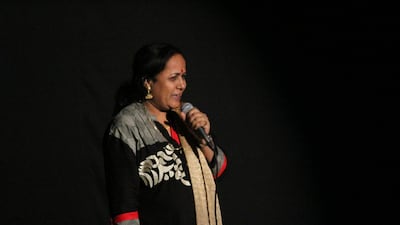For the last three weeks, Deepika Mhatre has been tremendously busy. Over three- dozen media interviews including a few television appearances have left her exhausted and exhilarated at once. “I feel like I’m in a trance,” says the 43-year-old Mumbai resident.
Mhatre is a simple, unpretentious woman who works hard to earn a living. She takes the 4:30 am local train every morning from one end of the city to the other, boarding and de-boarding compartments on the way, looking for eager customers to sell her bag full of imitation jewellery. At 6:30 am, she makes a hasty retreat to a Mumbai suburb to spend the next seven hours working as a cook in five homes. For the past eight years, she has followed the same drill.
But Mhatre’s humble lifestyle perked up last September, when she premiered as a standup comic, with a fresh and unique voice. The novelty of seeing a domestic helper on stage, taking digs at her elite employers has pulled legions of audiences to her shows. Since then, her monotonous days have been complemented by cheerful evenings. Now she heads out for open mic events in uptown venues of Mumbai, at least a few nights a week. While the gigs are still unpaid, Mhatre has become a sort of a celebrity within the country. “Being famous is a very good feeling,” she says.
Mhatre grew up in a Mumbai chawl, fell in love and married a boy from her neighbourbood at 21, and never got a chance to think about her dreams. Within a few years, her husband developed asthma and she had to step out of home to keep the home fires burning. Cooking, babysitting, selling pickle and papad, she has done it all. “I enjoy doing every kind of work,” Mhatre says.
But being a domestic helper has been her longest occupation. It has also taught her a lot about inequality and discrimination.
__________________
Read more:
Comedian Eshaan Akbar on trying to highlight the humour in Islam
What does it take to be a successful stand-up comedian?
Is Sacha Baron Cohen’s ‘Who is America’ really exposing issues?
__________________
So, last year, when Sangeeta Vyas - a resident of the high-end Mumbai residential complex, where Mhatre worked as a maid - organised a talent show for domestic helpers, Mhatre chose to participate, and “crack jokes about her madams.” She unequivocally jested about how her employers always asked her not to apply ghee on chapattis and avoid cheese in sandwiches, but would never think twice about washing down burgers and pizzas. Vyas was impressed and so was a journalist at a leading Indian daily, who was watching Deepika at the show.
Soon, Mhatre was connected with Aditi Mittal, India’s leading standup comic. “When Aditi saw the recorded video of the event, she was fascinated by the unique concept of a domestic helper cracking jokes about inequality,” Vyas says. “She was floored by Deepika’s pleasing personality and confidence, so she took her under her wing.”
“When I met Aditi she kept insisting that I must agree to perform to show my talent to the world,” Mhatre recalls.
Mumbai-based standup comic Rohit Shah was assigned to help Mhatre prepare her set. Her two-minute performance at the residential complex talent show was fleshed out into a six-minute set.
Shah had a long chat with her to explore the ideas Mhatre wanted to perpetuate with her set. “She gave me all the punch lines,” Shah says. “All I needed to do was indicate which experiences could be turned into jokes.”
Mhatre says she was comfortable facing the audiences from the very first show. “I’m quite used to dealing with crowds in the Mumbai locals,” she laughs.
Over the past year, Mhatre has learnt how jokes work with different kinds of audiences. “It didn’t take her much time to nail the delivery,” says Shah.
“Rohit taught me how to conduct myself on stage and to pause when the viewers laugh,” Mhatre says.
Unsurprisingly, Mhatre has to pause quite often during her performance, as her audiences frequently crack up on jokes they have never heard.
She talks of receiving ‘special’ treatment at her workplace, where she uses a separate elevator assigned to maids and other workers. Her madams have kept separate plates and glasses for her. “That’s all okay, you may hide your utensils,” she quips during her performance. “But you still eat the chapattis I make. I’m still the one who applies balm when your body aches,” she scoffs, amid peels of laughter.
Mhatre is not worried about reprisal. On the contrary, she is “grateful that I got a platform to share the grievances of domestic helpers,” she says. “There are very few who can really speak up for themselves.”
She talks of employers who don’t permit their maids to sit on chairs and others who make them wait indefinitely for their salary. “Some madams also have a habit of regularly asking for extra work,” she says. “If I just make chapattis, I don’t like being asked to chop vegetables without being paid for it.”
A few women have approached her after her show, confessing that she “opened their eyes” about their behaviour towards domestic helpers.
Vyas’s experience has been different, though. “Very few women have actually recognised Deepika’s talent and appreciated her work. The talk of the town is that a maid got lucky and has made it big,” she says.
Mhatre recently quit her job as a maid to focus on comedy. It has, of course, affected her income, but her family is willing to make that sacrifice for her. “How many people like me get a chance to rise and pursue their dream?”

